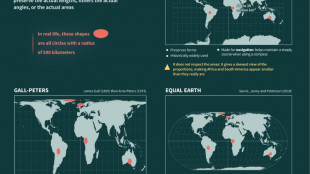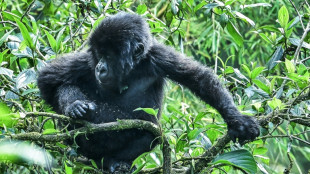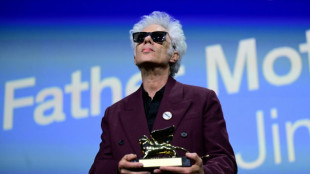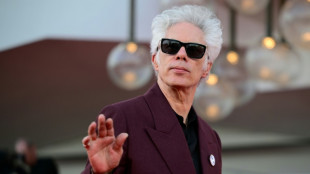
-
 Huge crowds at the Vatican as teen becomes first millennial saint
Huge crowds at the Vatican as teen becomes first millennial saint
-
Japan PM decides to quit as opponents seek leadership election: reports

-
 Bolsonaro supporters called to streets ahead of coup trial verdict
Bolsonaro supporters called to streets ahead of coup trial verdict
-
Russia hits seat of Ukraine government in war's biggest air attack

-
 All Blacks lose injured Taylor for second Springboks Test
All Blacks lose injured Taylor for second Springboks Test
-
Experts say great white shark likely killed Australian surfer

-
 'Correcting The Map': reshaping perceptions of Africa
'Correcting The Map': reshaping perceptions of Africa
-
Overcrowding kills infant gorillas in Rwanda habitat

-
 Thai cannabis-championing tycoon takes office as PM
Thai cannabis-championing tycoon takes office as PM
-
Japan, Mexico in goalless draw as World Cup preparations ramp up

-
 A 'real' movie fights back in anime-ruled Japan
A 'real' movie fights back in anime-ruled Japan
-
Will Harry meet King Charles on trip to UK?

-
 Indonesia's delayed new capital risks 'white elephant' status
Indonesia's delayed new capital risks 'white elephant' status
-
Catholic teen set to become first millennial saint

-
 Trump escalates crackdown threats with Chicago 'war' warning
Trump escalates crackdown threats with Chicago 'war' warning
-
Tough negotiations and uncertainty ahead of OPEC+ meeting

-
 'Palestine 36' shines light on Arab revolt against British rule
'Palestine 36' shines light on Arab revolt against British rule
-
'Build, baby, build': Canada PM's plan to counter Trump

-
 Craig's detective returns as new 'Knives Out' lights up Toronto fest
Craig's detective returns as new 'Knives Out' lights up Toronto fest
-
First India-Pakistan match since conflict fires up Asia Cup

-
 Rosa Roisinblit, activist for Argentina's 'stolen' children, dies at 106
Rosa Roisinblit, activist for Argentina's 'stolen' children, dies at 106
-
Australia halts logging for koala haven on eastern coast

-
 'Pessimist patriots': hard-right Reform UK widens appeal
'Pessimist patriots': hard-right Reform UK widens appeal
-
UK police arrest hundreds in latest Palestine Action demo

-
 Anisimova laments 'lack of fight' in US Open final loss
Anisimova laments 'lack of fight' in US Open final loss
-
Controlling emotions behind US Open triumph: Sabalenka

-
 Anthony, Howard among Basketball Hall of Fame inductees
Anthony, Howard among Basketball Hall of Fame inductees
-
Australian state halts logging for koala haven

-
 Taming inner 'tiger' takes Sabalenka to the top
Taming inner 'tiger' takes Sabalenka to the top
-
Japan's Oda completes career golden Slam at US Open

-
 Son scores and assists to lead South Korea over host USA 2-0
Son scores and assists to lead South Korea over host USA 2-0
-
Granollers, Zeballos win men's US Open doubles in thriller

-
 Sabalenka defeats Anisimova to retain US Open crown
Sabalenka defeats Anisimova to retain US Open crown
-
Bordeaux-Begles win to start Top 14 season, Stade Francais run in seven

-
 Luhrmann mines 'mythical' Elvis footage for new film
Luhrmann mines 'mythical' Elvis footage for new film
-
England's Kildunne set to miss Women's Rugby World Cup quarter-final with head injury

-
 Indie favourite Jarmusch beats Gaza war film to Venice top prize
Indie favourite Jarmusch beats Gaza war film to Venice top prize
-
Lisbon funicular cable disconnected before deadly crash: inspectors

-
 England have to 'prove a point' in Serbia test: Tuchel
England have to 'prove a point' in Serbia test: Tuchel
-
Poignant Portugal cruise, England unbeaten in World Cup qualifying

-
 England down Australia, face Scotland in Women's Rugby World Cup quarter-finals
England down Australia, face Scotland in Women's Rugby World Cup quarter-finals
-
Italy's Toni Servillo wins best actor at Venice

-
 Indie favorite Jarmusch beats out Gaza war film for Venice top prize
Indie favorite Jarmusch beats out Gaza war film for Venice top prize
-
China's Xin Zhilei wins best actress award at Venice Film Festival

-
 England to face Scotland in Women's Rugby World Cup quarter-finals after record-equalling win over Australia
England to face Scotland in Women's Rugby World Cup quarter-finals after record-equalling win over Australia
-
Jihadists kill 63 in attack on Nigerian town

-
 UK police arrest 150 people in latest Palestine Action demo
UK police arrest 150 people in latest Palestine Action demo
-
Sinner and Alcaraz set for gripping third act in US Open final

-
 McIlroy in hunt for first win since Masters at Irish Open
McIlroy in hunt for first win since Masters at Irish Open
-
Laboured England beat Andorra to extend 100 percent record on road to World Cup


'Zombie' misinformation: 'Rape Day' hoax resurfaces on TikTok
The hoax that rape was legal for a day was knocked down by fact-checkers two years ago. But it went viral again this year on TikTok, illustrating what researchers call "zombie" misinformation.
The stomach-churning falsehood that groups of men have declared April 24 as "National Rape Day," giving them free rein to commit sexual violence, crept its way to TikTok fame in 2021, sparking alarm in countries including the United States and Britain.
In a sea of videos, many with millions of views, terrified women declared plans to lock themselves in their rooms all day and men vowed to protect them against imaginary assailants.
In one, a hulking bare-torsoed man appeared to sharpen an axe with a whetstone, warning troublemakers not to "touch anyone I know."
An 11-year-old girl in Britain "afraid of being raped" went to school armed with knives, local media reported citing police officials.
TikTok users seized on reports of unrelated sexual crimes just before April 24 that year as evidence of the lurking threat, lending further credence to the myth.
Multiple fact-checking organizations debunked the misinformation. But that did not nip it in the bud.
This year, the hoax went viral on the same platform once again, the watchdog group Media Matters for America said, underlining what researchers say are the limits of debunking to stop or even slow the spread of misinformation.
"We call these kinds of situations zombie claims, meaning they are rumors that keep popping up, no matter how many times you debunk it," said Laura Duclos, from MediaWise, a digital media literacy initiative of the nonprofit Poynter Institute.
"Some zombie claims pop up because they are related to a certain event or date," Duclos told AFP.
- 'Fodder for misinformation' -
Raising alarm about the return of "Rape Day" this year, TikTok users declared their intention to carry tasers, handguns, and in one video, a firearm "with the safety (catch) off."
While AFP is not aware of any official reports of violent crimes because of the hoax, it lays bare the dangerous potential of even debunked falsehoods to whip up threats, hysteria and chaos.
When asked about TikTok's response to the hoax, a spokesman told AFP that "content promoting this despicable behavior would be removed if it was found on our platform."
Words such as "rape" are suppressed by TikTok, with a search redirecting users to a helpline and educational resources. But some videos can go completely undetected if they use no obvious keywords in their posts.
Users promoting the hoax also found workarounds such as "r@pe" and "national r day."
Last week, the platform appeared to crack down on the loopholes immediately after AFP shared with the TikTok spokesman a screenshot of multiple "Rape Day" videos that came up using those search words.
Searches using those two workarounds now yield "no results found."
TikTok "ought to get smarter" about preventing such hoaxes by rigorously studying patterns of how they spread, said S. Shyam Sundar, co-director of the Media Effects Research Laboratory at Pennsylvania State University.
"Sensational stories that prey on people's innate fears and desires are always going to be a fodder for misinformation, regardless of whether they have been debunked in the past," Sundar told AFP.
"Hoaxes may have a short shelf life but can linger in the warehouse for decades only to be recycled every now and then."
- 'Game of telephone'
The precise origin of this hoax in April -- observed as sexual assault awareness month -- is unclear.
According to Media Matters, its earliest mention was a 2021 tweet that cautioned people in Britain that "boys have made a 'national rape day'" and urged them to carry deterrents such as pepper spray for safety.
The message quickly spread on TikTok, going viral.
"It's common for misinformation to start on one platform and jump to others, losing context and making it that much harder to find the original source of the information," said Duclos.
"At that point you're playing essentially a game of telephone."
Stopping a wildfire hoax, Duclos said, is down to users "exercising due diligence before resharing misinformation" -- which in this case could be a simple keyword search of "national rape day" that leads to multiple fact-checks from credible outlets.
"The fact that this lie has re-emerged... demonstrates what psychologists call a 'sleeper effect,'" Sundar said.
"The upshot of this is that users and the platform ought to realize that debunking is not as long-lasting as the actual information, underscoring the need to reinforce the debunking message every so often."
burs-ac/bfm
O.Bulka--BTB
